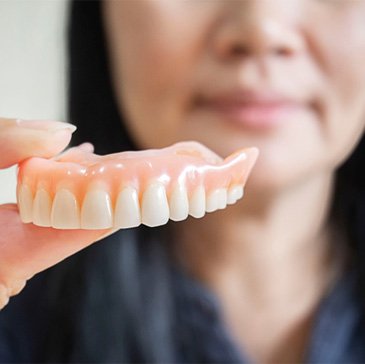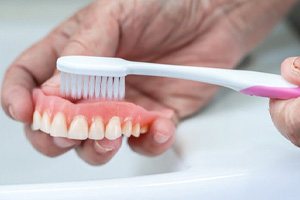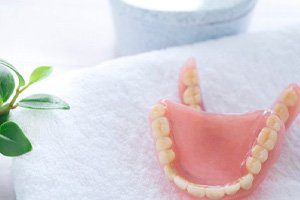Dentures — Waco, TX
Reliable, Natural-Looking Tooth Replacement

Dentures have been around in some form for thousands of years. Over the centuries, they have evolved to become the comfortable, efficient dental prostheses that they are today. If you have suffered moderate to severe tooth loss, dentures may be the ideal way for you to regain your lost smile, prevent oral health problems, and once again enjoy all of your favorite foods. Dr. Cofer and Dr. McNutt would be happy to help you take advantage of this remarkable treatment, so call us today to schedule a consultation for dentures in Waco here at Premier Family Dental.

Why Choose Premier Family Dental for Dentures?
- In-House Dental Implant Placement
- Lifelike, Long-Lasting Dental Materials
- Quick, High-Quality Treatment
What Are Dentures?

A denture is a prosthesis that consists of artificial teeth (made either of acrylic or porcelain) that are attached to a gum-colored base. Each permanent denture is custom-made, so it fits in perfectly with a patient’s mouth and provides them with a comfortable, well-aligned bite. Dentures, in some form or another, are a suitable treatment option for most people who have lost some, most, or all of their teeth.
Who’s a Good Candidate for Dentures?

Whether you’re missing a few or all of your teeth, pretty much anyone who has suffered from tooth loss can get dentures. During your consultation with us, we can discuss whether or not this is the ideal tooth replacement option for you. Even if you don’t make a great candidate right away, this doesn’t mean it’s out of the question. By restoring the health of your gum tissue and bone structure, dentures may be in your future.
EFFECTS OF MISSING TEETH

There are all sorts of different ways that tooth loss can occur. According to the American College of Prosthodontists, the common causes of missing teeth include tooth decay, gum disease, and trauma, like a sports injury or accident. Tooth loss can lead to a variety of negative consequences over time. Here are just a few of them:
- Facial Sagging: Without teeth, your facial muscles aren’t being supported. Your cheeks can appear sunken in, and your lips wrinkled, leaving you looking older than you are.
- Difficulty Speaking: When you’re missing teeth, it can become difficult to enunciate your words, making it harder for others to understand you.
- Trouble Eating: If you can’t chew harder foods, you are leaving out foods that contain essential vitamins and nutrients.
- Low Self-Esteem: Having gaps in your smile can take a toll on your self-confidence, therefore negatively impacting your social and work life.
WHAT QUALIFIES YOU FOR DENTURES?

If you’ve experienced significant tooth loss, lots of damaged/decayed teeth, and sufficient gum tissue and jawbone deterioration, dentures are likely an excellent option for you. Just like any tooth replacement option, wearing dentures requires that you are committed to your oral hygiene routine. You must be committed to caring for your restoration and your oral health.
The number of teeth that you’re missing will determine which type of denture is ideal to meet your needs. For the most part, dentures are more affordable than other tooth-replacement methods, making them a good option for patients who are unable to invest lots of money in their smiles.
ALTERNATIVE TOOTH-REPLACEMENT OPTIONS

Patients who are not good candidates for dentures can explore other options, like dental bridges or implants:
- Dental Bridges: Dental bridges are ideal for patients who are only missing one or a few teeth. Just like the name entails, a dental bridge “bridges” the gap where you are missing your tooth. They require healthy adjacent teeth surrounding the missing tooth to support the bridge.
- Dental Implants: A dental implant is a titanium post that is inserted into the jawbone. An attachment tooth (or teeth) is fastened to the end of the implant as a permanent tooth replacement method. For this procedure, patients must have solid bone structures. This option is costlier than traditional dentures.
Learn More About Dental Implants
Your Options for Dentures
FULL DENTURES
A full denture replaces an entire arch of teeth — either all of the top teeth or all of the bottom teeth. A traditional denture is secured in the mouth via natural suction or with the help of a mild adhesive.
PARTIAL DENTURES
A partial denture is designed to replace multiple teeth throughout an arch, even if the missing teeth are not all adjacent to one another. This type of prosthesis may require metal clips or other attachments to help it stay securely in the mouth.
IMPLANT-RETAINED DENTURES
Just like traditional full and partial dentures, an implant-retained denture provides partial or total tooth replacement. However, rather than relying on clips or natural suction to remain in the mouth, it is anchored in place via dental implants. The implants help to fortify the jawbone and enable the prosthesis to be as strong, comfortable, and natural-feeling as possible. This type of denture may either be removable or permanently fixed in place.
How Dentures Are Made

Once you decide that dentures are right for you, you may be wondering what the process of getting dentures looks like. By knowing how your dentures are made, you can appreciate them that much more. Whether you are getting a partial or full denture, here’s what you can’t expect.
What Are Dentures Made Of?

Dentures are made up of two different parts. Here’s what each one is comprised of:
- Dental Base: This is the foundational structure that gives the replacement teeth support. It can be made from a variety of materials, including acrylic, nylon, porcelain, resin, or metal. Full dentures are usually made from acrylic because it can be tailored to match your natural gum tissue. Partial dentures might use metal clips with an acrylic base.
- Replacement Teeth: The replacement teeth are often made from resin or porcelain. However, porcelain is most popular because it looks and feels like natural teeth. It is also a very durable material. Since porcelain can be abrasive on adjacent teeth, it is typically only used for full dentures.
The Denture Creation Process

Each denture is custom-made for each patient, so it requires a multi-step process. Here is a step-by-step of what the process typically looks like:
- Step 1: Your dentist will take impressions of a patient’s upper and lower gums. This is used to create a plaster model that acts as a replica of the mouth. The model is used to make sure your final denture is the perfect size and shape. Measurements of the jaw may also be taken.
- Step 2: The case is sent to the dental laboratory where the dentures are crafted. They will create a wax version of the gumline.
- Step 3: Replacement teeth are set into place. A mechanical device, called an articulator, is used to attach the teeth with wax. The technician will make minor adjustments by shaping and carving the wax to make sure it looks like your gum tissue. This wax base will be used for your finished dentures.
- Step 4: The wax dentures are sent to your dentist for a fitting. If they are approved, the dentures are sent back to the dental lab to complete the process.
- Step 5: Once back at the lab, the technician will boil the dentures to melt away the wax portions. To do this, the dentures are placed in a flask, which is a holding device into which plaster is poured to maintain the shape of the dentures. Then, the entire flask is placed in hot water to melt the wax.
- Step 6: Holes are made in the teeth so the material can attach to it. A liquid separator is added to the plaster layer to stop the acrylic from sticking to it. Acrylic is then injected into the flask to replace the wax.
- Step 7: The plaster is carefully removed using special lab tools to reveal the denture. The acrylic dentures are placed in an ultrasonic bath to remove any remaining plaster.
- Step 8: Any excess acrylic will be cut from the denture. After trimming, the denture will be polished.
- Step 9: Now that it is ready, you will need to return to the practice for a fitting. Adjustments will be made as needed to ensure everything feels and looks great!
Adjusting to Your New Dentures

It’s normal for patients to feel some discomfort when they first get dentures. You may experience mild soreness and have difficulty speaking and eating. Fortunately, your mouth will adjust to your dentures, and they will end up feeling similar to natural teeth. To speed up this adjustment period, stick to soft foods and exercise your facial muscles. If your discomfort persists, give us a call so we can help.
Benefits of Dentures

When you are missing several, most of, or all of your teeth, it can be very difficult to complete daily tasks that you once found easy. Tooth loss can take a toll on various areas of your life. Fortunately, dentures are life-changing for those who have few or no teeth. Here are just some of the many ways that dentures can completely transform your quality of life!
Psychological Benefits

It is often difficult for people who are missing all of their teeth to accept their tooth loss. This can lead to negative effects on social life and self-esteem, as well as a higher risk of experiencing sadness and depression. When you restore your smile with dentures, you can enjoy an increase in confidence. Dentures are able to reduce anxieties about your appearance, speech articulation, chewing ability, and much more!
Clearer Enunciation
Having gaps in your smile can make it more challenging to speak clearly. To pronounce and perform words, your lips and teeth need to be positioned properly. When you can’t touch your tongue to your teeth, some words become very challenging to enunciate. Since dentures replace your missing teeth, they can allow you to pronounce your words more clearly when you speak. After just a short adjustment period, you will be talking just like you used to!
Improves Nutrition

Many foods that are good for you are tough in texture. This includes fruits, vegetables, and healthy proteins. When you can’t chew your food thoroughly due to tooth loss, you can experience issues like indigestion and even malnutrition. With your new and improved ability to chew, dentures can allow you to enjoy an expansive diet. Ultimately, dentures can help you receive the nutrients you need to thrive.
Preserves Oral Health

If you still have some remaining natural teeth, getting dentures can help to prevent them from shifting around to fill in the gaps. Dentures also help to bear some of the weight of regular chewing. This reduces the wear and tear of your existing teeth.
Expands Opportunities

Making a good first impression is important – especially when it comes to interviews, promotions, and sales. Your smile is one of the very first things that people notice about you, so having a complete smile will do nothing but help you. In fact, some studies have found that the probability of being employed is negatively associated with having poor oral health.
Understanding the Cost of Dentures
So, maybe you’re thinking of getting your own dentures. It’d be great if you are — such prosthetic teeth could greatly restore your smile! That said, you may want to consider the cost of dentures in Waco first. Every patient is different, so our office can only offer a treatment estimate at your consultation. This visit will then let Drs. Cofer and McNutt learn your denture’s true price. Still, we at Premier Family Dental will work to ensure your care is affordable. If you’d like to learn more, just keep reading or call our office for details!
FACTORS THAT AFFECT THE COST OF DENTURES
Various factors influence dentures’ cost. Overall, though, the main ones are:
- Need (or not) For Prep Work: A denture treatment will cost more if you need extra services beforehand — tooth extraction, gum disease therapy, etc.
- Type of Denture Base: While most denture bases are made of acrylic, this plastic comes in different kinds. Some, naturally, are more expensive than others.
- Replacement Tooth Material: A denture’s teeth tend to be either acrylic or porcelain. The former is cheaper but wears easily. The latter, meanwhile, is pricier but lasts longer.
Remember that cheap dentures usually aren’t ideal when assessing the items above. In many cases, the least costly models use subpar acrylic. As such, looking for quality is crucial.
Are Implant Dentures More Expensive?
Put plainly, yes — implant dentures are more expensive than regular ones. However, their features more than justify the high price.
Per their name, implant dentures secure themselves with dental implants. They thus have permanence and stability that other kinds lack. Furthermore, their ability to work like natural teeth restores more of your chewing ability and improves your confidence. As a result, these dentures can let you eat and speak calmly without fear of slippage!
Besides, implant dentures work as an investment that pays off with time. Standard ones need replacing every 5-7 years, while implant ones can last 10-15 years with good care.
Does Dental Insurance Cover Dentures?
Thankfully, many dental plans include dentures in their coverage. A standard one will usually pay 50% of their cost once you’ve met the deductible.
Of course, there are exceptions. Every policy is unique, after all, so some might not offer the right coverage. Given that fact, talk with your insurance company to confirm your benefits beforehand. If you need help, the Premier Family Dental Team can even assist you with this process!
Other Options For Making Dentures Affordable
Admittedly, not all patients have dental insurance. Even so, though, there are other ways to make dentures affordable. Our own office has options like:
- An In-House Membership Plan: In exchange for a low monthly (or yearly) fee, Premier Family Dental gives patients a 5-20% discount on non-preventive services. Said services also include denture treatments!
- Flexible Financing: Our practice works with flexible financing plans through CareCredit and Compassionate Finance. Both services would let you pay for dentures in monthly installments rather than a lump sum. That way, you can cover the cost over time.
In the end, the cost of dentures shouldn’t worry you too much. You can trust New Premier Dental to guide you, so go ahead and book a visit!
Dentures Aftercare

With the help of your brand-new prosthetics, you’ll be able to make the most of a full smile again. Since this treatment offers incredible advantages for you and your oral health, you’ll need to know how best to maintain them in the long run. This should include visiting your dentist biannually for regular checkups, brushing them daily, and more so that you can make the most of them for years to come. Here’s what to keep in mind when caring for your dentures.
Removable Dentures
Remove After Eating

Remember to take your dentures out after every meal so that you can rinse them off. This is to prevent food debris and bacteria from accumulating on your prosthetics, which could place your oral health at risk of gum disease if left unchecked. Avoid using hot water when rinsing your dentures, as this can warp the material and may require premature replacements.
Clean Your Prosthetics

Whenever it’s time to clean your prosthetics, be sure to remove them first. Not only will this allow you to clean your gums and the rest of your mouth, but you’ll also get the chance to scrub the underside of your dentures where bacteria can easily settle. Only use mild hand soap or denture cleanser to clean them; avoid using toothpaste as it can be too abrasive to the material. If you aren’t going to wear your dentures right after, soak them in a cup of water or denture-cleansing solution so they stay moist and bacteria-free.
Keep Your Dentures Safe

If you’re cleaning your prosthetics, remember to place a towel or something soft underneath them to keep them safe. This should help break their fall in case they slip from your hands, which can help avoid damaging or breaking them. Place your dentures out of reach of small children and pets.
Remove Dentures When You Sleep

You’ll need to wear your dentures the entire 24 hours after first receiving them. After that, it’s important to remove them before going to sleep. This period will allow circulation in your gums, providing your tissues with the nutrients necessary for good health. Leaving your dentures in for too long can end up increasing the risk of issues like soft-tissue irritation, gum/tongue plaque, and pneumonia. While you sleep, keep your dentures soaking overnight.
Notice Changes

Watch out for any abnormalities while using your dentures. Whether this involves gum/mouth sores or signs of infection, you should let your dentist know right away if you have any concerns. Our team will be able to evaluate your situation and come up with an appropriate plan to fix your dentures. Avoid trying to fix any damage to your prosthetics on your own, as this can simply make matters worse.
Teeth-in-a-Day Dentures

While traditional dentures require several new steps to maintain them, Teeth-in-a-Day dentures will involve a more familiar experience. Simply brush your new teeth twice a day, using a soft-bristled toothbrush, floss them at least once daily or after meals, and rinse them with antibacterial mouthwash. With these simple steps, as well as visiting your dentist every six months, you’ll be sure to keep them in great shape for a long time.
Denture FAQs
Want to know more about dentures in Waco? This popular prosthetic helps restore countless patients’ ability to eat, speak, and smile confidently each year. Below are answers to some of the most common questions we hear from patients about dentures. If you have further questions or concerns, don’t hesitate to contact our office!
WHAT IS THE AVERAGE AGE FOR DENTURES?
In general, tooth loss is an issue that is far more common among older patients. Approximately 66% of adults between the ages of 40 and 64 are missing at least one tooth, compared to only 33% of adults aged 20-39, according to the National Center for Health Statistics. Thus, you are more likely to need partial dentures or full dentures over the age of 40. However, while the need for false teeth generally increase as you get older, people of all ages can potentially be candidates for dentures.
HOW LONG WILL YOU HAVE TO WAIT TO GET DENTURES AFTER YOUR TEETH ARE PULLED?
You can likely expect to wait between six to eight weeks after your teeth are pulled before you can get dentures. This waiting period gives the gums a chance to heal and will help ensure that your dentures fit properly. The exact amount of time depends on the type of denture in question. For example, if you are getting implant dentures, you will have to wait between four to six months for the implant to fully integrate with the surrounding bone. Same-day dentures, on the other hand, can be placed on the same day as an extraction. While this type of restoration will allow you to eat and speak right away, your denture dentist in Waco won’t have a chance to preview the fit first. This may become an issue later down the line if the shape of the underlying bone and gums change as your mouth heals.
WHAT CAN’T YOU EAT WITH DENTURES?
You can continue to eat many of your favorite foods with high-quality dentures. However, you will likely have to make some adjustments to your diet. For example, you should avoid sticky foods like peanut butter and gummy candies that can pull your dentures out of place. In addition, nuts, popcorn, apples, carrot sticks, corn on the cob, and other hard foods can damage or dislodge dentures. It’s okay to eat these types of foods on occasion, but they should be avoided for the most part. Finally, opt for softer meats like boiled chicken instead of steak or pork chops. Tough meats require an excessive amount of chewing, which can put a lot of stress on both your dentures and your gums.
IS IT HARD TO TALK WITH DENTURES?
Teeth play an important role in speech. When you first get dentures in Waco, it will take time to get used to speaking with them because you’re so used to speaking with your natural teeth. Every person adjusts at their own pace, but generally speaking, the more you practice, the faster the adjustment process goes. Reading your favorite magazine, newspaper, or book out loud and repeating difficult-to-pronounce words is a good exercise. You can also try speaking slowly at first. Fast speech may come out muffled if you’re not used to talking with dentures. If you notice your dentures shifting while you speak, try biting down and swallowing before you begin to talk so that your false teeth are in the proper position. If you need extra stability, apply a bit of denture adhesive to help keep your new teeth in place.
